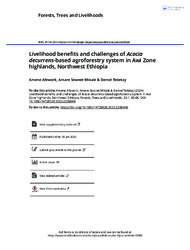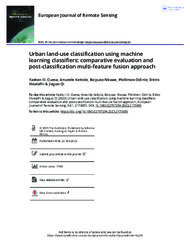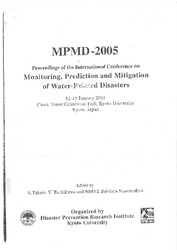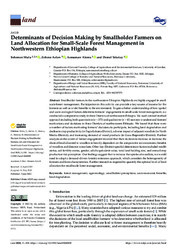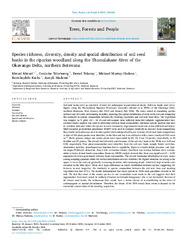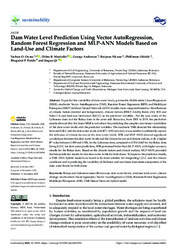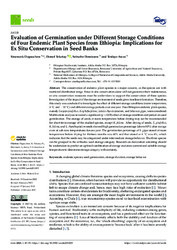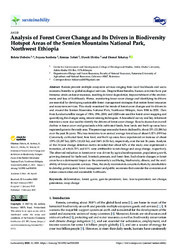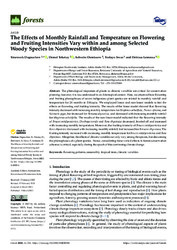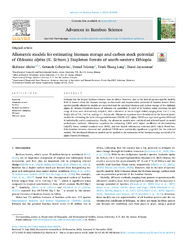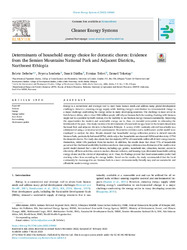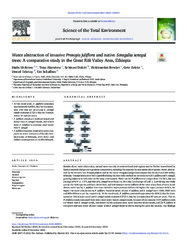Faculty of Natural Resources
Browse by
To apportion its share from and contribute to the achievements of the objectives of BUAN as stipulated in the BUAN Act No. 12, 2015 (BUAN A), the objectives of FNR are to: -undertake, promote and facilitate research and scholarly investigations in the fields of natural resources; advance and disseminate knowledge and skills through teaching, learning and practical skills training in the fields of natural resources; -contribute to national and international scientific and technological development in the fields of natural resources; support and contribute to the realization of national economic and social development in the fields of natural resources; -contribute to the central and social life of the community in the fields of natural resources; and advance the intellectual and human resource capacity of the nation of Botswana and international community in the fields of natural resources.
Collections in this community
-
Book Chapters [3]
Section or devision of a book. -
Research articles [81]
Recent Submissions
-
Evaluating bank technical efficiency in SADC region.
(Elsevier Ltd, 2024-03-30)Efficiency is generally defined as the capacity to deliver desirable results with little effort or input. A bank cannot afford to allocate limited resources at random in a competitive market. Only once the efficiency factors ... -
Livelihood benefits and challenges of Acacia decurrens-based agroforestry system in Awi Zone highlands, Northwest Ethiopia.
(Taylor and Francis Ltd, 2024-01-18)Acacia decurrens (hereafter Acacia) agroforestry system has been expanding rapidly in the northwestern highlands of Ethiopia. The agroforestry system provides multiple eco-environmental services; however, there is inadequate ... -
Urban land-use classification using machine learning classifiers: comparative evaluation and post-classification multi-feature fusion approach.
(Taylor and Francis Ltd., 2023-02-22)Accurate spatial-temporal mapping of urban land-use and land-cover (LULC) provides critical information for planning and management of urban environments. While several studies have investigated the significance of machine ... -
Spatiotemporal trend analysis of groundwater level changes, rainfall, and runoff generated over the Notwane Catchment in Botswana between 2009 and 2019.
(Springer Science and Business Media, 2023-03-11)The semi-arid south-eastern part of Botswana has recently been experiencing severe water shortages, and the demand currently surpasses the supply in the greater Gaborone area. Within the context of increased stormwater ... -
Estimation of Likely Impact of Climate Variability on Runoff Coefficients fromLimpopo Basin using Artificial Neural Nefwork (ANN)
(Disaster Prevention Research Institute KYoto University., 2005-01-12)Forecasting future response behaviour of a semi-arid catchment in terms of runoff coefficient being trivial, an attempt has been made io apply an Artificial Neural Network (ANN) model to-forecast the run off coefficients ... -
Agroforestry for Degraded Landscapes: Recent Advances and Emerging Challenges - Vol. 2.
(Springer Singapore, 2021-01-01)This book presents various aspects of agroforestry research and development, as well as the latest trends in degraded landscape management. Over the last four decades, agroforestry research (particularly on degraded ... -
Promoting Bamboo-Based Agroforestry for Enhancing Ecosystem Services from Degraded Lands.
(Springer Singapore, 2021-01-01)Agroforestry innovations on degraded lands have been prioritized for promoting environmental sustainability, advancing food and fodder security, and achieving United Nations Sustainable Development Goals. Although neglected ... -
Determinants of Decision Making by Smallholder Farmers on Land Allocation for Small-Scale Forest Management in Northwestern Ethiopian Highlands.
(MDPI, 2022-06-03)Smallholder farmers in the northwestern Ethiopian Highlands are highly engaged in small-scale forest management. Participation in this activity can provide a key source of income for the farmers as well as wider benefits ... -
Tourism and climate change in Africa: informing sector responses
(Taylor & Francis, 2023)Informing Africa’s tourism sector responses to the IPCC-AR6’s projected climate change impacts remains paramount. This study reviews the evolution of knowledge on climate change and tourism in Africa, examining gaps, ... -
Ecological interactions, local people awareness and practices on rodent-borne diseases in Africa: A review
(Elservier, 2023-02)Several anthropogenic activities exposure humans to the risk of rodent-borne diseases. These activities are but not limited to logging, clearing land for crop cultivation, and consuming rodents. Rodents are a highly diverse ... -
Species richness, diversity, density and spatial distribution of soil seed banks in the riparian woodland along the Thamalakane River of the Okavango Delta, northern Botswana.
(Elsevier B.V., 2021-10-21)Soil seed banks serve as reservoirs of seeds for subsequent regeneration of plants. Soil seed banks were investigated along the Thamalakane Riparian Woodlands (hereafter referred to as TRWs) of the Okavango Delta, northern ... -
Dam Water Level Prediction Using Vector AutoRegression, Random Forest Regression and MLP-ANN Models Based on Land-Use and Climate Factors.
(MDPI, 2022-11-11)To predict the variability of dam water levels, parametric Multivariate Linear Regression (MLR), stochastic Vector AutoRegressive (VAR), Random Forest Regression (RFR) and Multilayer Perceptron (MLP) Artificial Neural ... -
Evaluation of Germination under Different Storage Conditions of Four Endemic Plant Species from Ethiopia: Implications for Ex Situ Conservation in Seed Banks.
(MDPI, 2023-02-06)The conservation of endemic plant species is a major concern, as the species are with restricted distribution range. Since in situ conservation alone will not guarantee their maintenance, ex situ conservation measures must ... -
Analysis of Forest Cover Change and Its Drivers in Biodiversity Hotspot Areas of the Semien Mountains National Park, Northwest Ethiopia.
(MDPI, 2023-02-07)Forests provide multiple ecosystem services ranging from local livelihoods and socio-economic benefits to global ecological services. Despite these benefits, human activities have put immense strain on forest resources, ... -
The Effects of Monthly Rainfall and Temperature on Flowering and Fruiting Intensities Vary within and among Selected Woody Species in Northwestern Ethiopia. Forests.
(MDPI, 2023-03-10)The phenological responses of plants to climatic variables are critical for conservation planning; however, it is less understood in an Afrotropical context. Here, we observed how flowering and fruiting phenophases of seven ... -
Allometric models for estimating biomass storage and carbon stock potential of Oldeania alpina (K. Schum.) Stapleton forests of south-western Ethiopia.
(Elsevier, 2023-02)Ethiopia has the largest bamboo resource base in Africa. However, due to the lack of species-specific models, little is known about the biomass storage, carbon stock and sequestration potential of bamboo forests. Here, ... -
Determinants of household energy choice for domestic chores: Evidence from the Semien Mountains National Park and Adjacent Districts, Northwest Ethiopia.
(Elsevier, 2023-04-04)Energy is a cornerstone and strategic tool to meet basic human needs and address many global development challenges. However, ensuring energy supply while limiting energy’s contribution to environmental change is a major ... -
Water abstraction of invasive Prosopis juliflora and native Senegalia senegal trees: A comparative study in the Great Rift Valley Area, Ethiopia
(Elservier, 2023)Besides direct water abstraction, natural water scarcity in semi-arid and arid regions may be further exacerbated by human-assisted changes in vegetation composition, including the invasion by non-native plant species. ... -
Agrotourism as peripheral and ultraperipheral community livelihoods diversification strategy: Insights from the Okavango Delta, Botswana
(Elservier, 2023)The potential of agrotourism for livelihoods diversification in remote (peripheral) and extremely remote (ultraperipheral) traditional, agrarian communities is indeed a testament of its uniqueness to enhance rural ... -
Extraction of Pesticides from Plants using Solid Phase Microextraction and QuEChERS
(South African Journal of Chemistry, 2013)A study employing dispersive solid phase extraction in the formof the quick, easy, cheap, effective, rugged and safe (QuEChERS) method and solid phase microextraction (SPME) for the cleanup of pesticides in plant samples ...

